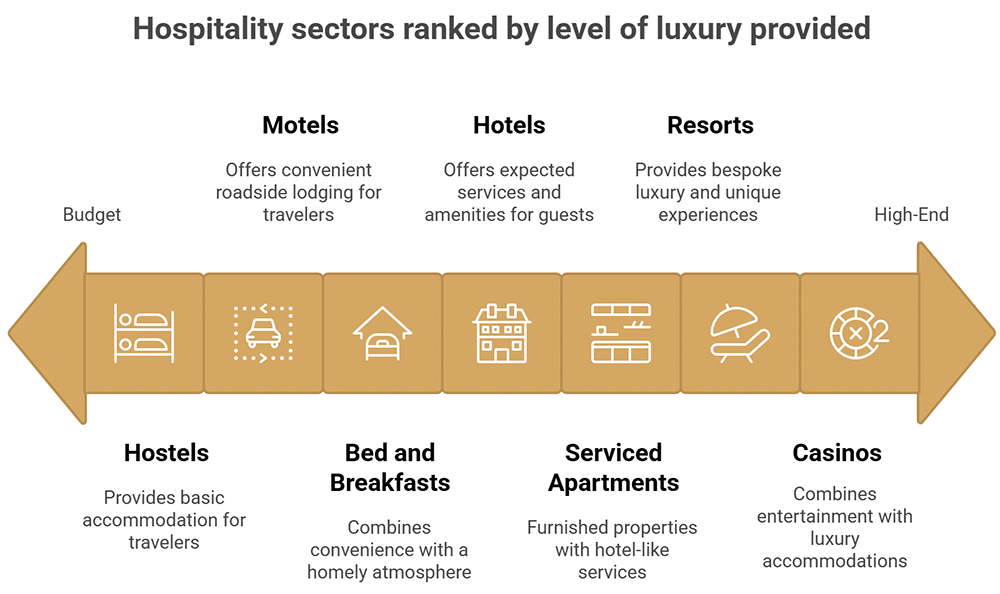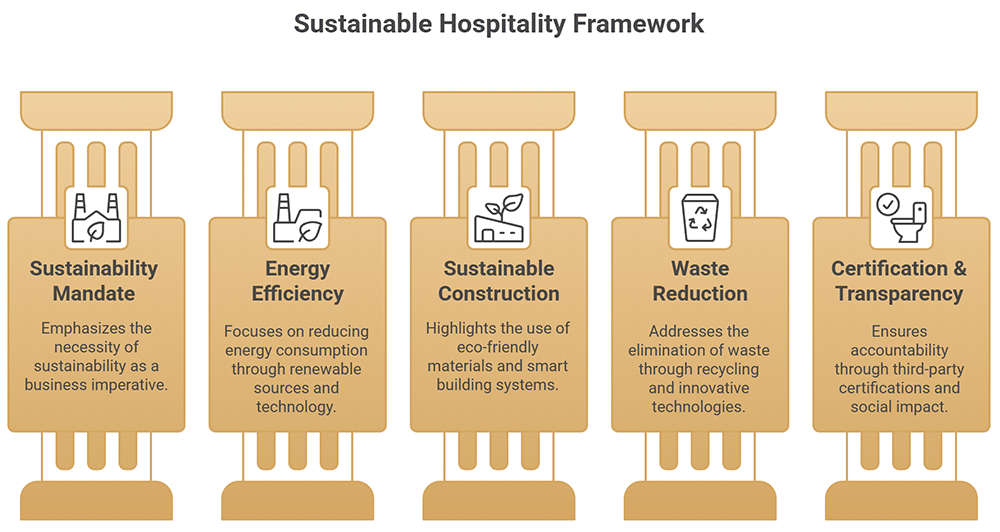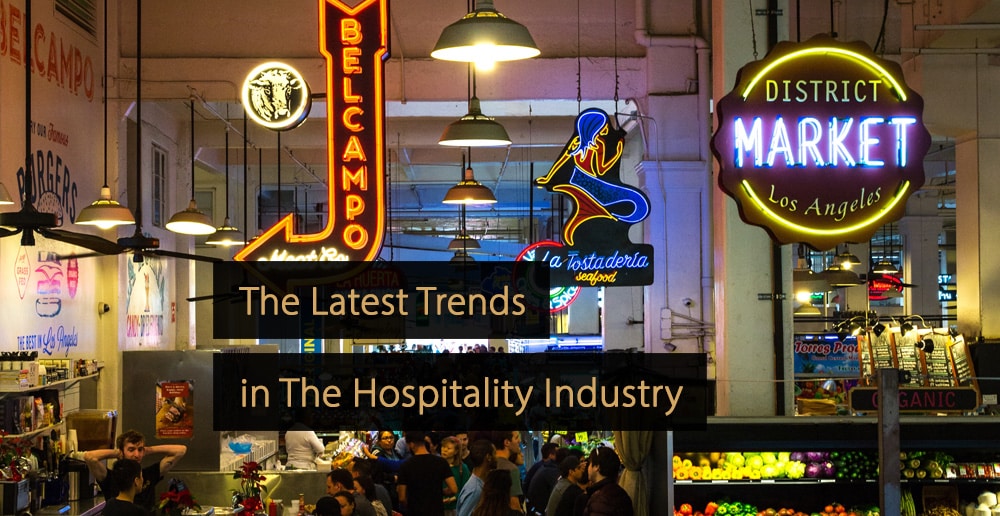What aspects serve to define the hospitality industry? While many will provide common answers, such as accommodations and logistics, the single factor that underpins the entire concept involves customer satisfaction. Let us take a look at the different facets of the hospitality sector in great detail to appreciate its true scope.
Table of Contents:
- What is the Hospitality Industry?
- The Global State of the Hospitality Sector
- An Overview of All Hospitality Sectors
- Different Management Types Within the Hospitality Sector
- Emerging Hospitality Marketing Trends
- Top Tech Trends in the Hospitality Sector
- Evolving Guest Expectations and Trends in the Hospitality Sector
- Sustainability and Environmental Stewardship
- Revenue Management & Hospitality Sector
- The Workforce Crisis in the Hospitality Sector: Challenges and Solutions
- Find Hospitality Jobs With These Channels
- Find the Next Step in Your Hospitality Management Career
- Hotel Websites to Check for Hospitality Management Jobs
- Become a Hospitality Manager Using These Job Boards
- Global Outlook of Hospitality Sector (2025-2035)
- More Related Industries
Extra: The Impact of the Corona Crisis on Hospitality Sector
What is the Hospitality Industry?
We have all heard of this term, yet it is quite vague to those unfamiliar with the sector. Hospitality is one facet of the service industry. It primarily involves addressing customer satisfaction and catering to the needs of guests. This can be addressed with lodging, amenities, and travel arrangements. However, it is still important to break the concept of hospitality into three sections for brevity and clarity. These concepts are undoubtedly already familiar to you:
- Accommodations
- Food and drink
- Tourism and travel
Let’s now go ahead and take a look at each one in greater detail to appreciate the “bigger picture”.
The Global State of the Hospitality Sector
The global hospitality industry shows strong recovery and transformation, driven by innovation, sustainability, digitalization, and evolving traveler expectations.
Economic Impact and Scale
The hospitality sector is one of the world’s largest and most dynamic industries. In 2025, the global travel and tourism economy is projected to reach $11.7 trillion, representing approximately 10.3% of global GDP, according to WTTC research. This marks a full rebound and expansion beyond pre-pandemic levels. The industry now supports more than 371 million jobs worldwide, accounting for one in every ten positions globally.
Recovery Momentum
According to the UN Tourism Barometer (Q1 2025), international tourist arrivals grew by approximately 5% compared to 2024 and now exceed 2019 benchmarks. Regions leading the recovery include the Middle East and Asia-Pacific, where travel demand has surged on the back of easing visa requirements and increased air connectivity.
Julia Simpson, President & CEO, WTTC, puts it:
“2025 marks a historic milestone for global travel and tourism, with visitor spending projected to exceed $2.1 trillion and total sector GDP reaching a record $11.7 trillion. This is proof of the resilience and renewed confidence of travelers worldwide.”
An Overview of All Hospitality Sectors
1) Accommodations
Accommodations within the hospitality industry primarily involve where guests will be staying and the amenities they are provided with. From luxury properties to budget hotels and hostels, each location is intended to suit your distinct needs. It can be argued that accommodations represent the veritable backbone of the hospitality sector. As a result, management will place a great deal of emphasis on what they have to offer. According to the Skift research, the global accommodation market, valued at $1.2 trillion, is projected to reach $1.3 trillion by 2026.
Bed and Breakfasts
Bed-and-breakfast establishments combine a sense of convenience with a down-home flavor that is attractive to many individuals, particularly those who are constantly on the go. According to the Mordor Intelligence report, the global B&B market is currently valued at around $32.16 billion and is forecast to reach USD 41.50 billion by 2030 at a 5.2% CAGR over the period. These tend to be smaller boutique properties, yet their presence within the sector cannot be understated due to the many existing locations.
Hotels
Hotels (both franchises and boutiques) are the most well-known properties within the hospitality sector, with about 18.5 million hotel rooms globally. From brand names such as Hilton and Radisson to smaller brick-and-mortar establishments, guests expect to be provided with services and amenities equal to the price they paid for the room in question. Hotels contribute billions of pounds in revenue to this industry every year. For example, Marriott International operates 8,785 properties across 139 countries, while Hilton has 7,530 properties in 123 countries.
Motels
Known for their sense of mobile convenience, business travelers frequently employ motels, and those who are looking to enjoy budget-friendly prices while traveling between two destinations. Having said this, some occupants will spend weeks or longer at a motel. Recent years have witnessed massive advancements regarding technology as well as staff responsiveness.
Hostels
Hostels are often associated with student travelers; yet, they can be used by anyone who desires a room for the evening. They are generally rented on a 24-hour basis, and most hostels are located close to city centers (to provide easy access to those unfamiliar with the location). Hostels are also known for their ability to offer rock-bottom prices. According to Grand View Research, the global hostel market size is projected to reach USD 11.04 billion from USD 7.21 billion by 2030, growing at a CAGR of 6.5% from 2024 to 2030.
Resorts
Resorts fall into the high-end of the hospitality sector spectrum. Yoga retreats, wellness centers, and properties designed to provide unfettered views of nature all fall into this category. Modern resorts aim to please if you have been looking for a home away from home while enjoying a bespoke sense of luxury.
Serviced Apartments
Serviced apartments are fully furnished properties that can be made available for both short- and long-term stays. According to Future Market Insights, more than 60% of business travellers prefer apartments because they provide the comfort and amenities of hotels, and most of them are near business complexes. Room service, daily housekeeping, access to fitness centers, and free wireless Internet connectivity are some of the hallmarks associated with these locations.
Time-Sharing Plans
This type of accommodation will divide up the amount of time that guests are allowed to stay. Each customer is provided with an arrival and departure date. Timeshares are often associated with extremely popular tourist locations such as the Costa del Sol in Spain or the Algarve region of Portugal.
2) Food and Drink
The second hospitality sector is “Food and Drinks”. According to EHL Insights, the food and beverage sector represents about 30-50% of total hotel revenues. It is already a foregone conclusion that guests must be offered food and drink services during their stay. This is another cornerstone of hospitality in general, as the quality and availability of such items will often impact the overall customer experience and, in turn, the hotel’s status.
Restaurants
Restaurants represent a sizeable portion of the hospitality sector as a whole. The hotel often brands these premises, and depending upon the amenities, some will even offer Michelin-starred service options. Guests will often base their overall experience around the quality of food that restaurants provide. Smart kitchen technology, AI-powered menu design, and sustainability certifications (like Green Key) are becoming the norm. According to the National Restaurant Association report, restaurant industry sales are expected to reach $1.2 trillion by 2030.
Catering
Hotels and resorts can often include catering services as a portion of their standard pricing plans. Larger properties will provide catering to address business luncheons, professional seminars, and similar gatherings that restaurants might be unable to accommodate efficiently. According to Grand View Research, the global meetings and conventions market (MICE) is expected to grow at a compound annual growth rate of 9.2% from 2025 to 2030, reaching USD 1,466.94 billion by 2030.
Bars & Cafés
Bars and cafes are excellent places to refresh or enjoy a tasty meal. Furthermore, they are known for their laid-back social atmosphere, a notable difference from many in-house restaurants. Most properties will offer such options because they tend to draw reliable clients.
Nightclubs
Some hotels are partnered with a proprietary in-house nightclub (Hotel W Barcelona is a perfect example). Nightclubs are an excellent means to obtain additional revenue, and it is important to point out that the public is normally allowed to enter alongside property guests. According to the Business Research Company, the Pubs, Bars, and Nightclubs Market is projected to grow at a 6.3% CAGR, reaching $99.67 billion by 2029.
Tea and Coffee Shops
Whether referring to a proprietary bistro or a third-party firm such as Starbucks, which has rented out space, tea, and coffee shops offer guests an additional sense of convenience during their stay. These smaller establishments have become increasingly popular by providing wireless access alongside on-the-go services.
3) Other Hospitality Related Sectors
Individuals must be provided with a timely means to arrive at their destination. Trains, airplanes, cruise liners, and even car hire services are all encompassed by this category. In fact, without this hospitality sector, the hospitality industry as a whole would cease to exist without the presence of such options.
Travel Agents
Travel agents essentially take on the role of intermediaries within the hospitality industry. Clients often use them to expedite booking a holiday and, perhaps most importantly, finding the most appropriate levels of accommodations.
Tour Operators
Tour operators are professionals or firms that specialize in providing package holiday deals. Those looking for specific arrangements, such as all-inclusive cruises or family packages, often utilize them.
Online Travel Agencies (OTAs)
Online travel agencies are increasingly important in the hospitality sector due to their Internet presence. According to Asia Travel Tech, OTAs capture 40% of the global travel market across hotels, airlines, packaged tours, rail, and cruises. OTAs are great options if you want to obtain amenable deals via online searches. Sometimes, a free membership can offer additional benefits such as email alerts and substantial discounts if you book within a certain time frame.
Cruises
Cruise liners are often paired with hotels because travelers may use ports of debarkation for days. In other words, it only makes sense that customers are provided quality property during their stay at various locations. Having said this, many franchised hotels have placed their properties on the ship itself. CLIA’s report estimates 37.7 million passengers sailing across 310 vessels, with luxury and expedition cruises leading demand.
Car Rental
A huge hospitality sector is “Car Rental”. Car hire services can be used in synergy with hotels by guests looking to avoid the hectic nature of public transportation. While travel agencies may provide these, they might also be able to be obtained directly at the property. The rise of electric vehicles (EVs) and app-based rentals (e.g., Hertz’s EV expansion) has transformed car hire into a connected mobility experience. Many hospitality brands now integrate car rental into all-inclusive packages.
Casinos
The hotel-casino relationship has been another advancement within the hospitality industry. Supplying an amazing source of entertainment while allowing guests to stay in the same complex is an extremely attractive concept. Certain customers may also receive compensation packages (“comps”) through casino credits or high-roller suites. Some notable examples include the MGM Grand Las Vegas, the Sands Monaco, and the Foxwoods Resort Casino.
Video: Hospitality Sectors Within the Hospitality Industry
Different Management Types Within the Hospitality Sector
Within the hospitality sector, there are several distinct management types, each with its own requirements regarding knowledge, skills, and qualifications. Some of the main types are explored below:
Restaurant Management
Restaurant management involves managing the core operations of a business within the restaurant industry. Most definitions specify that a restaurant is a business where customers can order food and eat the food on-site. That said, restaurants may be connected to other businesses in the hospitality sector, such as hotels.
In the article “Restaurant Management: Everything You Need to Know”, you can find out more about what restaurant management entails, the value of a good restaurant manager, and some of the qualities that are necessary, such as excellent communication and organization skills, a passion for service, and strategic thinking.
Travel Management
Travel management is an important part of the hospitality sector and can be briefly summarised as managing, organizing, and optimizing corporate travel. By enlisting the help of a travel manager or a travel management company, businesses can reduce costs and capitalize on industry contacts.
The article “Travel Management: All You Need to Know!” covers more about the specifics of travel management, the role of travel management companies, and the difference between in-house and external travel agents.
Hotel Management
Within the hospitality sector, hotel management involves overseeing day-to-day operations within a hotel or a business within the hotel industry. This can include supervising specific tasks, planning business strategy, assisting with marketing and customer service efforts, training staff, recruiting staff, and investing in the right technology.
In the “Hotel Management: Everything You Need to Know About Managing a Hotel” post, you can learn much more about what hotel management is, the education and skills needed for the role, the latest technology trends, hotel marketing strategies, and the various job boards available for finding vacant hotel management positions.
Video: What is Hospitality Management?
Emerging Hospitality Marketing Trends
Hospitality marketing is a make-or-break tool for the travel and hotel industry. You must apply the latest digital marketing tools to your hospitality business to remain abreast of your competitors. Using the right strategies, you can increase revenue and enhance your brand’s image. You can create the perfect marketing strategy by looking into how online users research and plan their travel tours and accommodation.
1. Data-Driven Personalization
Hospitality marketing has become increasingly powered by data analytics. Hotels now collect behavioral insights from booking patterns, loyalty programs, and social media to craft hyper-personalized campaigns. By predicting guest preferences and anticipating needs, brands deliver tailored messages that boost engagement, conversion rates, and long-term loyalty, while enhancing overall guest satisfaction and trust. Hotels that focus on creating outstanding guest satisfaction can increase occupancy by up to 20% according to McKinsey & Company research.
2. Influencer and Experiential Marketing
Influencer collaborations have evolved from paid endorsements to immersive storytelling experiences. Hotels now host travel creators who produce authentic, destination-focused content that connects emotionally with audiences. This approach builds brand credibility, expands reach among younger travelers, and encourages direct bookings by showcasing genuine, relatable experiences rather than traditional promotional messaging.
Dr Philippe Masset from EHL Hospitality Business School advises:
“The greatest strength of social media lies in the fact that content is driven by the users themselves. This proximity creates a direct impact, which can be further amplified by engaging influencers and trendsetters to promote new destinations.”
3. Sustainability and Purpose-Driven Branding
Guests increasingly favor brands aligned with their environmental and ethical values. Sustainable marketing highlights eco-certifications, community initiatives, and carbon-neutral operations. Purpose-driven campaigns that emphasize transparency, cultural preservation, and social responsibility not only attract conscious consumers but also differentiate hotels in a competitive market where authenticity outweighs pure luxury appeal.
4. AI-Powered Marketing Automation
Artificial intelligence enables precise targeting, dynamic pricing, and automated communication throughout the customer journey. From predictive email campaigns to AI chatbots offering tailored recommendations, automation helps hotels engage guests efficiently and at scale. This not only reduces marketing costs but also enhances personalization, improving response rates and maximizing booking opportunities.
5. Immersive and Interactive Content
Virtual reality (VR) and augmented reality (AR) have transformed hospitality marketing into an interactive experience. Guests can now take virtual hotel tours, explore amenities, and visualize destinations before booking. This immersive content increases traveler confidence, drives direct bookings, and offers a competitive edge by blending technology with emotional storytelling.
In the article “Latest Hospitality Marketing Trends,” you will find the latest hospitality marketing trends.
Video: 5 Hospitality Trends to Watch in 2025
Top Tech Trends in the Hospitality Sector
Information technology is just as important for the hospitality industry as it is for any other sector. Businesses can improve and innovate processes and even enhance customer experiences with the help of technology.
1. Artificial Intelligence
AI is redefining hospitality through data-driven automation and personalization. Over 70% of hoteliers believe AI will transform the industry. From AI chatbots handling 24/7 guest queries to predictive revenue systems optimizing room pricing, AI delivers efficiency, insights, and customized guest experiences via improving RevPAR and satisfaction simultaneously.
2. Internet of Things (IoT) and Smart Hotels
IoT technology transforms hotels into intelligent ecosystems where devices communicate to optimize comfort and energy efficiency. Smart lighting, thermostats, and occupancy sensors automatically adjust based on guest activity, reducing waste while improving convenience. These innovations create sustainable, data-informed operations and a more seamless guest experience.
3. Contactless Technology and Mobile Integration
Contactless technology, now a guest expectation, enhances safety and convenience through mobile check-ins, digital keys, and app-based service requests. With 96% of hoteliers investing in these systems, frictionless interactions have become standard. According to an Oracle report, about 73% of travelers prefer these options, underscoring their role in competitive differentiation.
4. Robotics and Automation
Robotics addresses labor shortages and operational consistency. Automated cleaners and delivery robots handle routine tasks efficiently, freeing human staff to focus on personalized service. The global hospitality robotics market, growing at 14.19% annually, is projected to exceed $470 million by 2028, marking a pivotal operational evolution.
5. Virtual and Augmented Reality
VR and AR technologies are revolutionizing marketing and booking experiences. Virtual property tours allow potential guests to explore rooms and amenities before making reservations, reducing booking uncertainty and improving conversion rates. These immersive experiences help properties differentiate themselves in crowded markets.
In the article “The Latest Technology Trends in the Hospitality Industry,” you will find the latest technology trends that hospitality companies should be aware of.
Evolving Guest Expectations and Trends in the Hospitality Sector
The modern traveler seeks more than comfort. They desire meaning, personalization, and emotional connection. Hotels must now deliver individualized, wellness-oriented, and flexible experiences.
1. Hyper-Personalization
Today’s guests expect experiences customized to their unique preferences. With 71% of travelers seeking personalized service, hotels are using AI and data analytics to tailor room settings, dining, and amenities. According to Deloitte, 57% of consumers are more loyal to personalized brands, leading to stronger retention, higher spend, and deeper emotional engagement.
2. Wellness and Experiential Travel
Wellness tourism has become a $1.3 trillion global market, growing faster than any other travel segment. Properties now go beyond spas, offering digital detox retreats, mindfulness programs, and AI-assisted sleep optimization. Gen Z travelers favor immersive, meaningful experiences, and up to 80% now prioritize authentic, transformative travel over conventional luxury.
3. Bleisure and Extended Stays
Both business and leisure travel continue to reshape hospitality. The bleisure market, expanding at 8.9% annually, reflects growing demand for “workcations.” Hotels are adapting with co-working spaces, reliable connectivity, and flexible check-in options. Nearly half of extended-stay bookings now exceed 28 days, showing travelers’ desire for mobility and comfort.
4. Authentic Local Experiences
Guests increasingly value cultural authenticity and local engagement. Hotels collaborate with regional artisans, chefs, and guides to offer cooking classes, craft workshops, and cultural tours. This approach deepens guest satisfaction while supporting local economies, preserving heritage, and transforming hospitality into a meaningful exchange between visitor and community.
5. Flexible Payment Options
Financial flexibility has become part of the guest experience. Around 43% of Gen Z travelers prefer “Buy Now, Pay Later” options, and 40% favor staggered payments. These systems make premium stays, upgrades, and experiences more attainable, encouraging higher spending and expanding accessibility across diverse traveler demographics.
Sustainability and Environmental Stewardship in the Hospitality Sector
Sustainability has become the cornerstone of modern hospitality. The industry now prioritizes carbon reduction, resource efficiency, and social responsibility as essential pillars of long-term growth.
1. The Sustainability Mandate
Sustainability is now a business necessity, not a marketing choice. With tourism responsible for 8% of global emissions, hotels must drastically reduce their carbon footprint. The Glasgow Declaration calls for a 50% cut in emissions by 2030, pushing brands to integrate eco-conscious design, operations, and accountability across every level.
2. Energy Efficiency and Renewable Power
Hotels are investing heavily in renewable energy through solar, wind, and geothermal systems. Smart sensors, LED lighting, and AI-powered energy management have become standard. These upgrades can reduce energy consumption by up to 40% and operational costs by 20%, delivering both environmental and financial returns.
3. Sustainable Construction and Design
Modern hotels prioritize green architecture using recycled materials, bamboo, and low-carbon concrete. LEED-certified projects now cost only 1–2% more but deliver long-term savings. Smart building systems adjust temperature and lighting automatically, while some properties offer in-room sustainability dashboards that encourage mindful guest participation in conservation.
4. Waste Reduction and Water Conservation
Progressive hotels have eliminated single-use plastics and introduced AI systems to predict and reduce food waste. Recycling, composting, and greywater reuse programs now divert tons of waste annually. Water-efficient fixtures and sensor-based taps conserve resources without affecting comfort, ensuring sustainability aligns seamlessly with guest satisfaction.
5. Certification, Transparency, and Social Impact
Third-party certifications like LEED, EarthCheck, and Green Globe validate sustainable practices. Over 60 global hotel groups, representing 25% of hotel inventory, adhere to Sustainable Hospitality Alliance guidelines. Beyond the environment, sustainability now includes social equity, fair-trade sourcing, and community empowerment, positioning hospitality as a force for regenerative growth.
Revenue Management & Hospitality Sector
Revenue management has evolved into a data-driven discipline that balances profitability with guest value. Hotels now employ advanced AI algorithms to adjust prices in real-time, factoring in booking trends, competitor rates, market demand, and local events. This dynamic pricing ensures optimal rates for every segment and booking channel.
With leisure travelers representing 58% of the U.S. market share, successful operators strategically balance business, group, and extended-stay segments through personalized pricing and targeted promotions. Beyond rooms, hotels increasingly rely on ancillary revenues, including spas, dining, events, and local experiences, to increase total profitability per guest.
Upselling, cross-selling, and personalized offers further enhance margins. As digital booking platforms grow more sophisticated, the focus has shifted from static pricing to predictive intelligence, enabling hoteliers to capture demand efficiently while maintaining competitive positioning and guest loyalty.
Discover the impact of revenue management on the hospitality industry by referring to this informative guide, ‘Revenue Management; Clearly Explained!’.
The Workforce Crisis in the Hospitality Sector: Challenges and Solutions
The hospitality industry faces a persistent workforce crisis, with severe staffing shortages, rising labor costs, and evolving employee expectations reshaping how hotels attract, retain, and manage talent.
1. Labor Shortage
Despite industry recovery, 65% of hotels report ongoing staffing shortages in 2025. Global hospitality employment remains nearly 10% below pre-pandemic levels, with the U.S. employing 16.99 million workers. Many hotels continue struggling to fill roles, particularly in housekeeping, food service, and front-office operations, hindering growth and service consistency.
2. Root Causes of Staffing Challenges
The labor shortage stems from multiple pressures. Wage increases have outpaced inflation but remain insufficient to offset rising living costs. Irregular hours and limited work-life balance deter many potential employees, while younger generations seek flexible, tech-enabled workplaces. Rural and seasonal regions also face unique hiring challenges due to limited local labor pools.
3. Strategic Solutions and Adaptations
Hotels are countering shortages with improved pay, benefits, and wellness initiatives. Automation helps manage service quality with fewer staff through AI chatbots and mobile check-ins. By investing in training, mentorship, and education partnerships, hotels foster retention. Diversified recruitment, including retirees, veterans, and students, broadens labor pipelines and stabilizes operations.
4. Technology as a Force Multiplier
Technology now plays a central role in addressing workforce gaps. Automated check-ins, robotic deliveries, and digital service platforms reduce repetitive workloads. AI assists with scheduling, forecasting, and training, allowing limited staff to focus on guest experience. These systems enhance efficiency while improving job satisfaction and operational resilience.
5. Flexible Work Models and the Future of Hospitality Labor
To meet new workforce realities, hotels are adopting hybrid staffing models combining permanent employees, part-timers, and gig workers. This approach maintains service flexibility during peak seasons while supporting worker autonomy. The future workforce will favor balanced, purpose-driven environments, where digital fluency and human empathy coexist at the heart of hospitality.
Our “Understanding Hospitality Careers and Positions” article provides insight into the main job roles available within hospitality and information on what you would be expected to do in each role.
Find Hospitality Jobs With These Channels
When finding jobs within the hospitality sector, it can be important to turn to a combination of different channels. After all, different employers will opt for different ways to advertise any available hospitality jobs, and you do not want to miss out on the ideal role just because you kept your search too narrow.
The “Find Hospitality Jobs With These Channels” article provides an in-depth look at the various channels available, complete with specific examples of some of the websites or platforms you can use.
Find the Next Step in Your Hospitality Management Career
If you are looking to take the next step in your hospitality management career, there are a number of things you can do to maximize your chances. Senior jobs within the hospitality sector will require relevant experience and skills, but you will also need to build a strong CV, look for jobs in the right places, and deliver at the interview stage.
Check out the article “Find the Next Step in Your Hospitality Management Career,” and you will find 10 tips to help you get ahead in the hospitality industry and move into a managerial position.
The Impact of the Corona Crisis on the Hospitality Sector
With the unwelcome arrival of COVID-19, the adverse effects of this invisible enemy on the hotel and hospitality sector have been phenomenal. Almost every country has tight travel restrictions, with full or partial lockdowns imposed on the entire population. As a result, many important regional and international business and leisure events have been canceled, including the Olympics, the UEFA Euro, and the ITB Berlin Travel Fair.
Businesses in almost every sector have faced restrictions, and because of the imposed lockdowns, many people have lost their jobs. And if no one works, they certainly can’t plan any holidays, especially not this year or next year.
The lack of bookings means that companies operating in the hospitality sector, like restaurants and hotels, have lost up to 90% of occupancy, while some are forced to close. And the ones that have remained open are willing to bear the high, ongoing costs to see what the future brings. There is no denying the virus’s substantial financial impact on hoteliers facing serious cash flow problems.
In the category “Corona,” you find a selection of tips that help hospitality and travel businesses recover and prepare for better times.
Global Outlook of Hospitality Sector (2025-2035)
The next decade promises transformative growth for global hospitality, though not without significant challenges. According to the World Travel & Tourism Council’s Economic Impact Research, the sector will inject $16.5 trillion into the global economy by 2035, accounting for 11.5% of global GDP with annual growth of 3.5%, outpacing the broader economy’s 2.5%.
The WTTC’s workforce analysis reveals that travel and tourism will create 91 million new jobs by 2035, representing one in every three new jobs worldwide. However, the industry faces a critical challenge: global workforce demand will outpace supply by more than 43 million people by 2035, creating a 16% labor shortage. UN Tourism projects international arrivals will grow 3-5% annually through 2025, with continued momentum as emerging markets contribute increasingly to global tourism flows.
The World Economic Forum’s Travel & Tourism Development Index emphasizes that realizing this potential requires strategic investments in sustainability, technology, and workforce development. Regional dynamics will shift dramatically, with Asia-Pacific markets and emerging destinations in Africa and South America experiencing the fastest expansion, while established markets must innovate to maintain competitiveness amid labor constraints and evolving traveler expectations.
It should now be clear to appreciate the depth and breadth of the hospitality industry. Not only is the hospitality sector continuing to evolve at a breakneck pace, but you can now enjoy amenities and options that would have seemed impossible in the past.
Want to Learn More About Related Industries?
The hospitality industry is part of the travel industry, and the hotel industry is part of the hospitality industry. All these industries have in common that they are large service industries worldwide and increasingly important in the modern age. But what is the difference between the travel and tourism industry? And what are all the hospitality sectors within the hospitality industry? In the following articles, you can learn more about related industries.
- Travel Industry; An Overview of One of the Largest Service Industries
- Hotel Industry; An Overview of All Different Types of Accommodations
- Hospitality Industry; Everything You Need to Know About Hospitality
- Tourism Industry; Everything You Need to Know About Tourism
- What is the Difference Between the Travel and Tourism Industry?
- Airline Industry: All You Need to Know About The Airline Sector
- Aviation Industry: Everything You Need to Know About the Aviation Sector
- Everything You Need to Know About the Cruise Industry
- Space Tourism: 5 Space Companies That Will Make You An Astronaut
More Tips to Grow Your Business
Revfine.com is the leading knowledge platform for the hospitality and travel industry. Professionals use our insights, strategies, and actionable tips to get inspired, optimize revenue, innovate processes, and improve customer experience.Explore expert advice on management, marketing, revenue management, operations, software, and technology in our dedicated Hotel, Hospitality, and Travel & Tourism categories.









Thank you for the article. The trends, revenue management, and hospital management of the hospital industry were thoroughly addressed in the article.